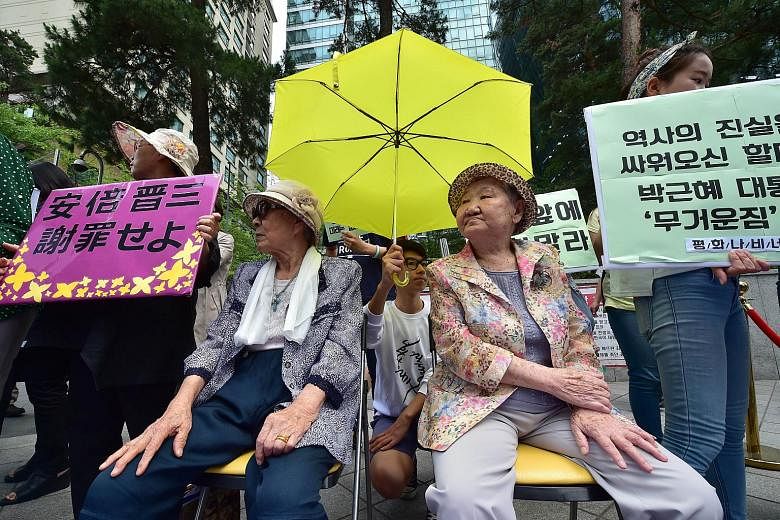SEOUL (Reuters) - As many as 200,000 Korean women were forced to work in Japanese military brothels during World War II, but Ms Kim Bok Dong is not hopeful that Japanese Prime Minister Shinzo Abe is about to apologise.
Ms Kim, 90, is one of South Korea's 47 surviving "comfort women", as those held at the brothels are euphemistically called, from among the 238 who came forward and shared their stories of abuse.
Many of them reject the term prostitution as inadequate, saying they were lied to and forced to leave their homes to endure horrific conditions as sex slaves.
Scholars continue to debate the number of women exploited, but activists say there may have been as many as 200,000 Korean victims, few of whom came forward. In China, estimates are sketchier, but also range as high as 200,000, with historians having identified 200 victims.
As the Asian neighbours await Mr Abe's statement marking the end of the war 70 years ago, time is running out for the women.
In South Korea, eight have died this year, five since June, and South Korean President Park Geun Hye said last week the Aug 15 anniversary may be the last chance for a Japanese leader to resolve the issue.
South Korea says Japan has not properly atoned for its wartime past. "I didn't know it would take this long ... if I had known, I wouldn't have come forward," Ms Kim told Reuters. "Until this is resolved, we will not be truly liberated."
Ms Kim was 14 when a Japanese police officer and a soldier came to her rural home, demanding that she accompany them to work at a garment factory.
"My mother protested: 'She is so little, what can she do?'But they said I could learn, so it should be all right, which is how I ended up going, thinking it'd be just for a few days."
Instead, she was gone for seven years, held at military brothels in southern China, Indonesia and Singapore.
Japanese conservatives, including Mr Abe, say there is no evidence of direct involvement of the country's military or government in kidnapping the girls.
Mr Abe has said he stands by a 1993 apology by then-chief Cabinet Secretary Yohei Kono that acknowledged the role of the Japanese authorities in coercing the women. In 1995, Japan set up a fund that offered letters of apology signed by prime ministers and financial aid to individual women.
In China, Ms Ren Lane, who lives in the northern province of Shanxi, kept secret for much of her life the fact that she was taken from a village as a 15-year-old girl and repeatedly raped by Japanese soldiers during the war.
An apology from Japan would be small solace, though she does not expect to live to see it.
Her son Liu Wanchang said the government had never been in touch about her story, despite recent media attention. Family members say the authorities ignored the plight of Ms Ren and others when China sought to normalise ties with Japan in the 1980s.
China has periodically released documents detailing Japanese acts against "comfort women".
It has said it will publish further confessions by Japanese"war criminals" about women forced to serve in military brothels ahead of the anniversary of the end of its war with Japan, to be marked with a military parade in Beijing on Sept 3.
On Tuesday, a records office in Heilongjiang province in northeast China released seven files that supported allegations of Japan's use of "sex slaves" during the war, Xinhua news agency said.
Taken from her Pyongyang home at age 13, Ms Gil Won Ok spent five years in Japanese military brothels in China.
She did not want to recount the events of that day.
"To be able to receive an apology, that will allow us to close our eyes," she said from the home she shares with Kim in Seoul, the Korean capital. "But I doubt that will happen easily."

